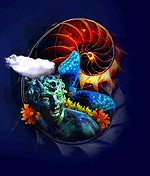|
|
Tickets to a Closing Play
Janet Buck
Gival Press (2003)
73 pages
ISBN number: 1-928589-25-1
Reviewer: Sam Sacks
In Tickets to a Closing Play, the reader is pleased to immediately find himself or herself on the same plane of vision as the author. The world rocks in the throes of violence-- the 2001 terrorist attacks, subsequent wars in Afghanistan and Iraq, as well as the new Palestinian Intifada and Israeli backlash. And yet, like Janet Buck, we feel these tremors from a peculiar distance. Instinctually we know that our lives have been affected, have been changed. But when we turn away from the newspaper or television, we find that very little in our world appears to have changed at all.
Understanding this newfound national phenomenon can serve as a keyhole to the consciousness of our time, and Buck goes about exploring it in the powerful opening poems of her release. These poems are heavily symbolic and the reader will find some of the symbols inscrutable; the best, however, pull off the trick of being metaphoric without mincing words. The very first line of the book, in “Having Coffee Over Death", is jarringly, confrontationally curt:
In Tel Aviv, a table is missing a leg.
Here, the scene is set in the targeted Israeli café that we have read about in gruesome detail, and more, the image of dismemberment is evoked. The end of the poem is equally visceral (as well as stacked with the types of double entendres that fill this book):
As I resent a dragonfly
that lands upon an open book,
treads of olive-colored tanks
mat red impatiens into blood.
What stands out, however, is not simply the frank images of violence: it doesn’t come as a shock to anyone that war is a bloody thing. We notice instead that this graphic imagery comes on the heels of verses declaring a detachment from the fighting. Buck is frustrated by a bug interrupting her reading. The contrast is revealing. In “Buried Rubies" she writes of an Afghanistan liberated from the Taliban, yet admits in the first stanza that it is a situation, “the Hell of which I’ll never know."
It seems paradoxical. How can a writer not know, yet tell us about it in her poetry. What we quickly discover is that this paradox is the very theme on which the poems are founded. America is a place deeply involved in violence, yet it is a country of comparative easy living; we are aware of profound tragedy, but more bothered by daily pettiness; our nation is most capable of controlling the fates of others, and therefore we, as citizens, are the most free from such external coercion. This book is filled with contrasting horror and pleasure, hope and doubt, relief and guilt. And these scenes of terror coming on the backs of Buck’s sweetly rolling iambs sharpen the dissonance.
Later, in “Buried Rubies", Buck writes:
I’ve had such a Hallmark life
of sequined luck and fluff parades.
This self-reproach gives us even more insight. She goads herself because her life now seems to her too comfortable. Neither Buck nor any American would trade lives with an Afghani; but the product of the paradox described above is an overweening sense of guilt. We cannot explain why we were born to the brunt of the down feather while others get the stick, and so we disparage ourselves and the qualities that we otherwise cling to to make our lives good. Even our inalienable rights can become intolerable in the face of the suffering of others. In “Upon the Threads of Slivered Glass", in reaction to 9-11, Buck writes:
I need to wear the massive grave
as padlocks on my liberties.
She denies herself even the basic freedom to heal from pain. These poems demonstrate the strange truth that freedom can serve as the condition that most constrains us.
Of course, if Buck watches these world events from afar, she is by no means a stranger to personal tragedy. The rest of the poems in Tickets to a Closing Play take place in more ordinary locales of sorrow, a nursing home, or the house of a recently deceased friend. They are about another form of coping with loss. A quartet of poems, scattered throughout the book, confront the dreaded task of cleaning out a dead friend’s house. In “The Whispering Fridge", she finds sour milk and,
On cardboard spouts,
a touch of Revlon’s Devil Red
that said your lips
refused to bother with a glass.
The lipstick shows up again later in the book, like footprints outside a smashed window, the memento mori the dead leave us so that we may not ignore them.
These are sorrowful poems to be sure, but Buck does not dwell over the death so much as the protocol of moving on afterwards. She writes:
The art of living on requires
the blending of survival moves,
waltzes of remembrance
upon the threads of slivered glass.
Breakage and survival, remembrance and letting go. Buck’s poems remind us that we cannot live on just one pole or the other.
|
|


